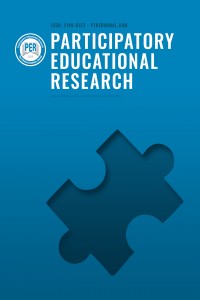Research Article
Year 2021,
Volume: 8 Issue: 4, 297 - 320, 01.12.2021
Abstract
References
- Akinci, M. A. (2007). Fransa'da Turkce ana dili egitimi ve iki dilli Turk cocuklarinin dil becerileri, İİ. Avrupa Turk Dili Bilgi Soleni, TOBB Ekonomi ve Teknoloji Universitesi, Ankara
- Baldik Y. (2018). Ana dili Turkce olmayan gocmen topluluklarin egitim sistemine katiliminda Turkce ogretiminin onemi, Master Thesis, Nevsehir Haci Bektas Veli Universitesi Sosyal Bilimler Enstitusu, Nevsehir.
- Bowen, G. A. (2009). Document analysis as a qualitative research method. Qualitative Research Journal, 9(2), 27-40. Doff, A. (1993). Teach English. Cambridge: Cambridge University Press.
- El-Aswad, A. A. (2002). A study of the ll and l2 writing processes and strategies of Arab learners with special reference to third-year Libyan University students. Unpublished Doctoral Dissertation, Newcastle University, England.
- Evans, J. (2001). Introduction: learning and teaching the complexities of writing in Janet Evans (ed.), writing in the elementary classroom: a reconsideration. Portsmout, NH: Heinemann.
Year 2021,
Volume: 8 Issue: 4, 297 - 320, 01.12.2021
Abstract
This study tried to determine the errors in writing samples to clarify the proficiency and deficiency of writing in the mother tongue of Turkish children who live in France. Participants in the study included 25 students who studied Turkish and Turkish culture at the level of primary and secondary public schools in Lyon, France. In the research, document analysis method was used within the framework of the qualitative research model. Twenty-five writing papers collected after a writing task assigned by Turkish and Turkish culture teachers during the class including 4,695 words, constitute the data set of the research. Writing samples obtained from students were accepted as documents and subjected to content analysis. Content analysis was done through Nvivo 12 qualitative data analysis program, which is frequently used in qualitative research. Within the scope of the research, a total of 1669 error codes were obtained in four categories from the documents. It was seen that the highest number of errors occurred in the category of writing errors with the error code 656, followed by spelling errors with the error code 622, inter-language transfer errors with the error code 248, and punctuation errors with the error code 143. The result is that students in France should go through a more qualified learning process in their native language writing skills.
Keywords
References
- Akinci, M. A. (2007). Fransa'da Turkce ana dili egitimi ve iki dilli Turk cocuklarinin dil becerileri, İİ. Avrupa Turk Dili Bilgi Soleni, TOBB Ekonomi ve Teknoloji Universitesi, Ankara
- Baldik Y. (2018). Ana dili Turkce olmayan gocmen topluluklarin egitim sistemine katiliminda Turkce ogretiminin onemi, Master Thesis, Nevsehir Haci Bektas Veli Universitesi Sosyal Bilimler Enstitusu, Nevsehir.
- Bowen, G. A. (2009). Document analysis as a qualitative research method. Qualitative Research Journal, 9(2), 27-40. Doff, A. (1993). Teach English. Cambridge: Cambridge University Press.
- El-Aswad, A. A. (2002). A study of the ll and l2 writing processes and strategies of Arab learners with special reference to third-year Libyan University students. Unpublished Doctoral Dissertation, Newcastle University, England.
- Evans, J. (2001). Introduction: learning and teaching the complexities of writing in Janet Evans (ed.), writing in the elementary classroom: a reconsideration. Portsmout, NH: Heinemann.
There are 5 citations in total.
Details
| Primary Language | English |
|---|---|
| Subjects | Other Fields of Education |
| Journal Section | Research Articles |
| Authors | |
| Publication Date | December 1, 2021 |
| Acceptance Date | May 5, 2021 |
| Published in Issue | Year 2021 Volume: 8 Issue: 4 |



